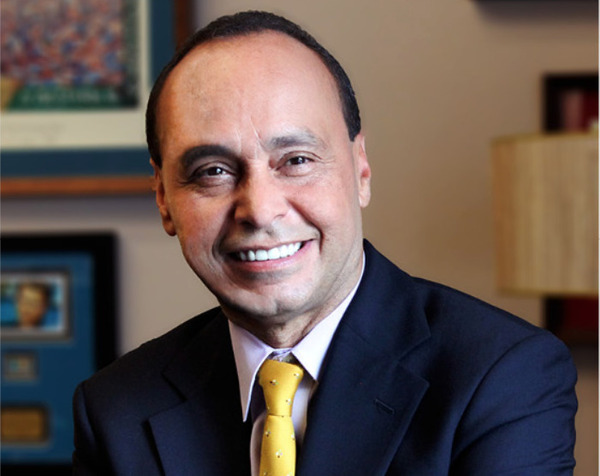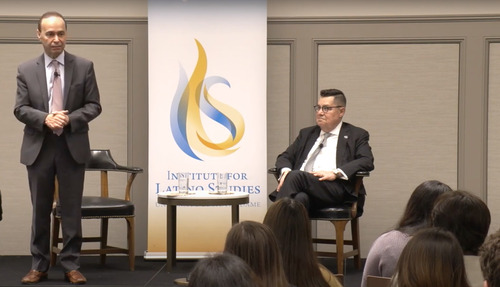
For more than three decades, Luis Gutiérrez was a dedicated public servant — first as an alderman on Chicago’s city council, and then as the democratic congressman representing Illinois’ 4th congressional district.
On March 23, Gutiérrez spoke to an audience of mainly Notre Dame students about the lessons he learned in politics, tracing the arc of his career from a childhood spent between Chicago and Puerto Rico, to the advocacy work he is doing now after stepping down from congress in 2019.
“Organize. Run for city council. Run for school board. Get involved in your communities,” he exhorted the group.
A noted champion of immigrant rights and Latino coalition-building, Gutiérrez was invited to speak as part of the Institute for Latino Studies’ Transformative Leadership Lecture Series.
The series engages prominent figures in politics, entertainment, the arts, business, activism, the church, and other fields who present their personal experiences and a vision of effective leadership. In addition to Gutiérrez, this past academic year’s speakers included Julián Castro, Lisette Nieves, and José Angel Gutiérrez (no relation).
Earlier in the day, Gutiérrez met with a small group of students for breakfast in the ILS lounge in Bond Hall. He also visited ILS Director and Professor of Political Science Luis Fraga’s class on transformative Latino leadership.
Gutiérrez served in the House of Representatives from 1993 to 2019, becoming the first Latino from Illinois to join the House. The 4th congressional district has been noted as one of the most strangely drawn and gerrymandered in the country, earning the nickname “earmuffs” from some media outlets due to its shape — it runs across parts of Chicago’s South, North and West Sides and into suburban Cook County. About two-thirds of its constituency is Latino, mostly Mexican-American.
When he was growing up in Chicago, segregation was still legal, he told the audience. His mom was a factory worker, and his dad started as a cab driver before becoming a building superintendent. His parents, both from Puerto Rico, spoke only Spanish at home. He spent several years living on the island as a child and later as a young adult.
“The story of going back and forth is my story,” he said.

Originally, his mother moved to New York, and his father to Chicago, the two maintaining a relationship over long distance. Gutiérrez noted how geographically spread out the Puerto Rican diaspora is since mass migration began during World War II. Today, there are more people of Puerto Rican descent living on the mainland than on the island.
“Many people think of Puerto Ricans in West Side Story. They think of cab drivers and bartenders. They forget we worked in the fields, on the crops in Pennsylvania, Connecticut, Ohio, so we are spread all over the United States of America.”
His political career began in earnest in 1986, after civil rights group MALDEF sued the city of Chicago under the Voting Rights Act for districting that harmed Latino constituents, paving the way for Gutiérrez’s election to the city council as 26th ward alderman. He served until 1992, enjoying the support of Chicago’s first Black mayor, Harold Washington.
It’s because of the civil rights movement of the 1950s and 1960s that he was able to carve his place in politics, he told the audience.
“That wasn’t free. People died. People were abused…So that one day, my voting rights, my civil rights could be guaranteed in this country,” Gutiérrez said.
“I owe all the men and women who sacrificed so much.”
One of his proudest achievements during his tenure as congressman was helping tens of thousands of people become U.S. citizens, he said. And he recalled pushing former President Barack Obama, of whom he was an early supporter, to pass comprehensive immigration reform and slow deportations during his administration. Their relationship, he said, was “tumultuous.”
At one point, he was arrested in front of the White House for protesting immigration policies. Gutiérrez was subsequently chastised by the president himself during a meeting of democratic leaders in the oval office.
“He didn’t keep his promise. And there was conflict.”
Eventually, Obama softened his stance on immigration, though it was far from ideal, according to the former congressman.
Today, Gutiérrez is focused on spending time with family and supporting political causes from the outside. He noted how fatigue contributed to his leaving congress, telling the group that he would have liked to “have taken a sabbatical, but you can’t do that in politics.”
But towards the end of the lecture, he sounded as if he were ready to return to the political arena.
“I’ve done my sabbatical. And I’m ready to come back.”
One topic that continues to fire him up is the lack of Latino representation in news media and other forms of television and film.
“We’re invisible. It almost reminds me of the day when I was a little kid.”
Also, the rights of children: he recalled working on cases of child abuse for the Department of Children and Family Services in Illinois, as well as being a school teacher in Puerto Rico. He remains adamant about the need for comprehensive immigration reform with a path to citizenship for the undocumented. Sovereignty for Puerto Rico is also on his mind, especially given the fiscal crisis and the disastrous response to Hurricane María from the U.S. government in 2017.
The talk ended with a call to action, with Gutiérrez appealing to students to harness political power in pursuit of justice, fairness, and equality.
“There’s many ways, you can find a way,” Gutiérrez said. “If you got here, you’re smart enough. Thank you for having me here this afternoon.”